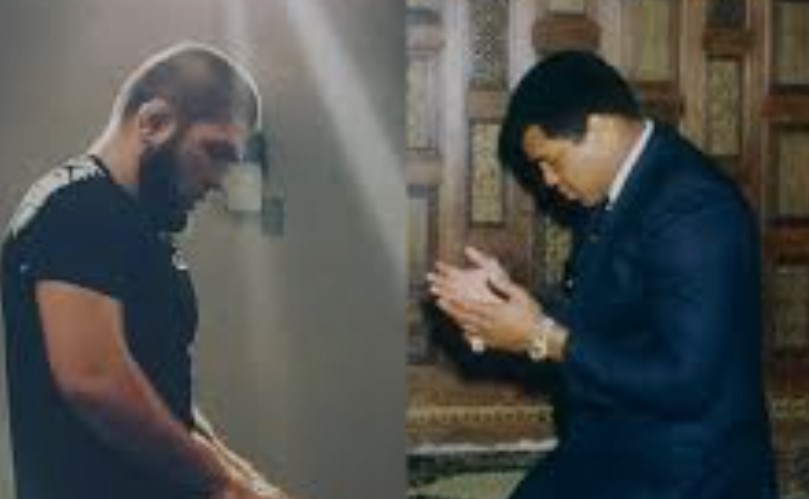Despite the growing amount of successful Muslim mixed martial arts (MMA) athletes, the sport continues to hold a negative perception within some Muslim communities. Many people question whether participating in MMA goes against Islamic beliefs and principles. In this article, we’ll explore the topic of MMA and its relationship to Islam.
Is MMA Haram In Islam?
According to some Muslim religious leaders, there are some concerning aspects of MMA that may go against the teachings of Islam. These concerns include strikes to the face, shorts that go above the knee, and potential for excessive violence.
“If you are watching Judo, there’s no problem because the gi covers the full body” – Dr. Zaki Naik
With Judo and other similar grappling martial arts such as Brazilian jiu-jitsu, no strikes to the face makes it permissible in Islam. However, MMA allows for striking to the face, which raises some concerns for Muslim practitioners.
“If any one of you has a fight with his brother, let him avoid the face.” (Al-Bukhari, 2560; Muslim, 2612).
With that being said, like with many things in Islam, there are different interpretations and opinions on this matter. Some argue that MMA is a form of self-defense and discipline, which aligns with the values of Islam. If you train MMA just for fun or self defense and only strike pads and dress modestly, than there is an argument that no harm in participating.
Others believe that as long as proper protective gear is worn and excessive violence is avoided, MMA can be permissible. When it comes to shorts that may go above the knee, there are also differing opinions. Some believe that as long as modesty is maintained and the shorts cover the awrah (private parts), it is acceptable.
Ultimately, it depends on how strict someone’s interpretation of Islamic teachings is and their own personal beliefs. It’s important to do thorough research and consult with trusted scholars before participating in MMA or any other potentially controversial activity.
At the end of the day, it’s about finding a balance between following religious principles and pursuing one’s passions. The key is to always be mindful and respectful of one’s faith while engaging in any activity, including martial arts. It’s always important to also respect the beliefs of others and not impose one’s own opinions on them.
BJJ, judo and wrestling is permissible/halal. If you feel the need to compete in a combat sport but have concerns about MMA, these can be a great alternative. It teaches self-defense techniques without the striking aspect and emphasizes control and technique rather than aggression and violence.
Cultural Concerns of MMA For Some Muslims
Not only is there debate over the permissibility of MMA in Islam, but there are also cultural concerns for some Muslims. In certain Muslim-majority countries or communities, MMA may be seen as a Western or non-Islamic practice, leading to its rejection among some individuals.
Although betting is not required as a fighter or a spectator, there is no doubt that this is a prevalent practice in the world of MMA. For Muslims, gambling is strictly prohibited in Islam and this may be another reason why some choose to avoid participating or attending MMA events.
The ring girls, who are often scantily dressed and carry signs indicating the round number, can also be a source of discomfort for Muslim spectators. This may lead to some Muslims avoiding MMA events altogether due to the potential exposure to immodest or sexualized behavior.
How Muslim MMA Fighters Express Their Faith
Khabib Nurmagomedov, a Russian-born fighter who is Muslim, is someone that is true to his religion and wears it proudly in the world of MMA. When he rejected Conor Mcgregor’s rude gesture of offering his alcoholic drink in a pre-fight press conference, he set an example for how Muslim MMA fighters can stay true to their faith while participating in the sport.
It’s also interesting to note that Khabib Nurmangomedov expressed his mixed emotions about the subject. He acknowledges that “Smashing People” was not a good thing and he encourages his Muslim fans to become better followers of the religion.
He also reiterates that the excessive strikes to the head is not good and that he prefers to finish fights with chokes rather than strikes. This shows that even though MMA is a violent sport, Muslim fighters like Khabib strive to maintain their faith and values while competing.
Khabib Nurmagomedov’s highlights are full of violent strikes to the head and ground-and-pound but he explains that he does give an opportunity for people to give up. Some saw it as trash talk but Khabib genuinely wanted them to just give up instead of being severely injured. This display of mercy and compassion is also in line with Islamic teachings.
He separates his fighting career from his religious beliefs but still manages to find a balance between the two. In fact, his faith is what gives him strength and guides him through his training and fights. Khabib’s dedication to his religion is admirable and something that should be highlighted in the world of MMA.
Final Thoughts
Mixed martial arts is much more than the status gained and the wins achieved. It’s about showcasing skills, discipline and perseverance while staying true to one’s values and beliefs. Training martial arts is an expression of your soul through bodily movements. It can be a spiritual pursuit as much as a physical one.
This article refers to ‘Bushido’ the way of the warrior and that is a perfect encapsulation of what MMA truly is. It’s not just about fighting, it’s about striving to be a better person both inside and outside the ring. Many fighters from various religions have found MMA to be beneficial for their lives and have been able to incorporate their beliefs into their training and fighting styles.
So, is MMA haram? To some, the answer is an easy ‘yes’. However, some martial arts are halal if they follow the principles of their religion and do not involve any prohibited activities.





